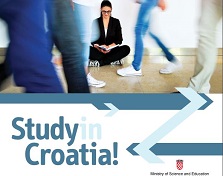Average monthly living expenses in Croatia are estimated to be between 400 and 700 EUR, depending on the type of accommodation and the city in Croatia.
Foreign currency exchange and traveller’s cheques
Foreign currency can be exchanged in banks, currency exchange offices, post offices or at some hotels’ reception desks. We advise foreign visitors to change large amounts at a time to avoid high service charges. The exchange rate is usually more favourable and the service faster in the currency exchange offices. Most of them are open from 8 am to 6 pm on workdays, but those located at the train and bus station should work 24 hours a day.
Credit cards
Major credit cards (American Express, Diners Club, Mastercard/Eurocard, Visa) are widely accepted across the country in shops, hotels and restaurants, but it is advised to check at every point of purchase whether credits cards are accepted. Credit cards can also be used to withdraw cash from many ATMs across the larger cities.
Banks
Banks are usually open from Monday to Friday from 8 am to 7 pm and on Saturdays from 8 am to 12 pm, but office hours may vary, especially in smaller towns. Banks are closed on Sundays and national holidays. Cash points (ATM-Automatic Teller Machines or bankomat in Croatian) are open 24 hours a day, and there are plenty of them (especially in larger cities).
Banks have branches throughout the country. Some bank services may also be available at the post offices (pošta).
Opening a bank account
There are no restrictions on international students to open a bank account in Croatia as long as they are at least 18 years old. An account can only be opened by visiting a bank in person.
The following documents are needed to open a bank account:
- Passport or identification card for foreigners issued by the Croatian authorities
- Residence permit, issued by the Croatian Ministry of Internal Affairs.
There are usually no charges for opening a current account, but there are charges for running accounts and these vary depending on the bank. Some banks also charge for closing an account.
When opening a current account in Croatia, students will receive a bank card (it usually takes seven days to receive it) and a PIN which will allow the account holder to withdraw cash from almost every cash point in the country. The card also allows to check the account balance and to pay bills (if paying for bills in branch offices of other banks or post offices, a small fee is charged). Some banks also offer electronic services which allow users to manage their bank affairs via the Internet.
An extra commission fee is charged for every money transfer to and from abroad. The commission depends on the destination and amount being transferred.
For a list of licensed banks in Croatia, please consult the database of the Croatian National Bank.
Living expenses
Average monthly living expenses in Croatia are estimated to be between 400 and 700 EUR, depending on the type of accommodation (student dorm or privately rented housing) and the city in Croatia. These amounts should be enough to cover food, accommodation, utilities, books, transportation and miscellaneous expenses. Of course, students may spend more or less than the estimated amounts, depending on their needs and lifestyle.





